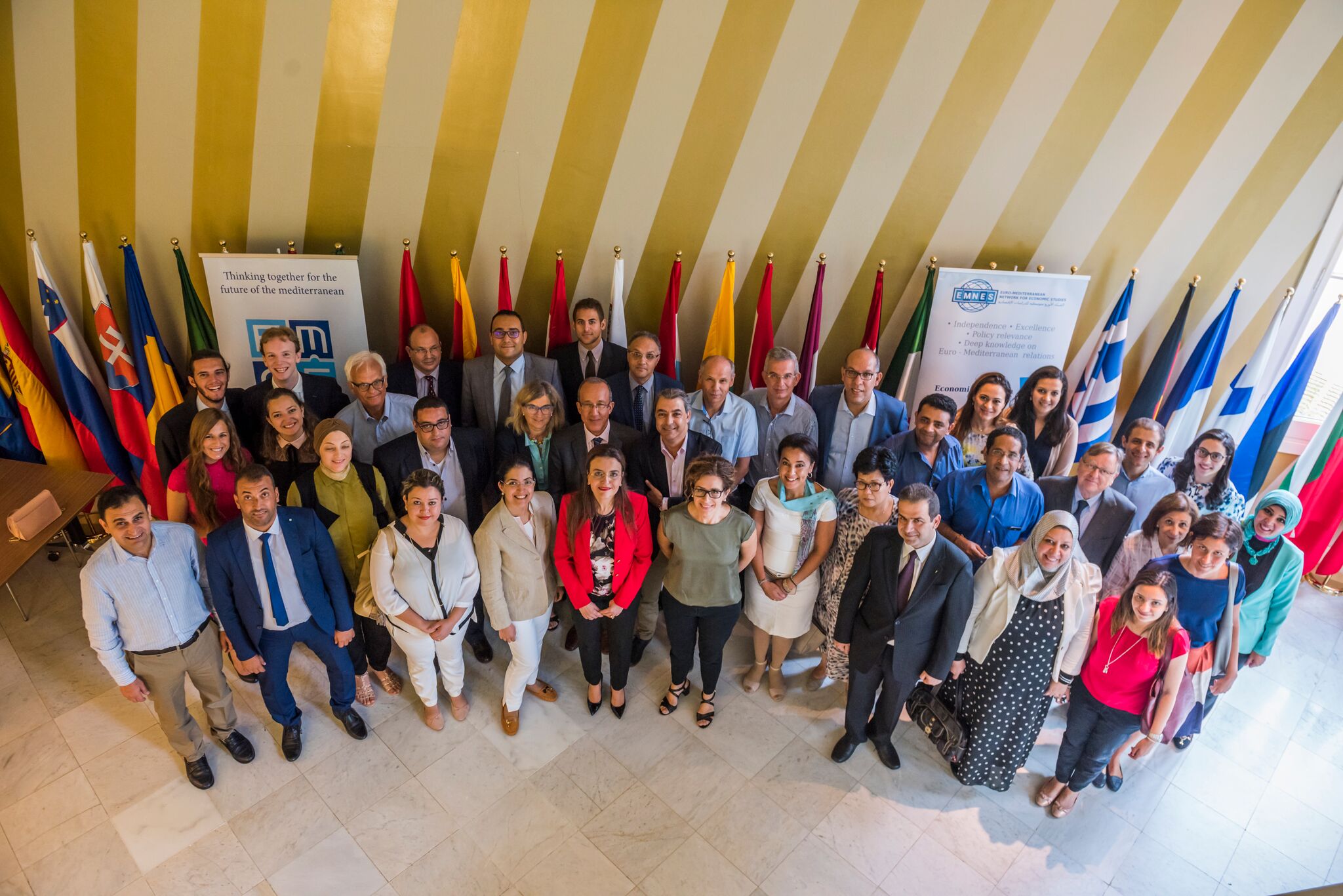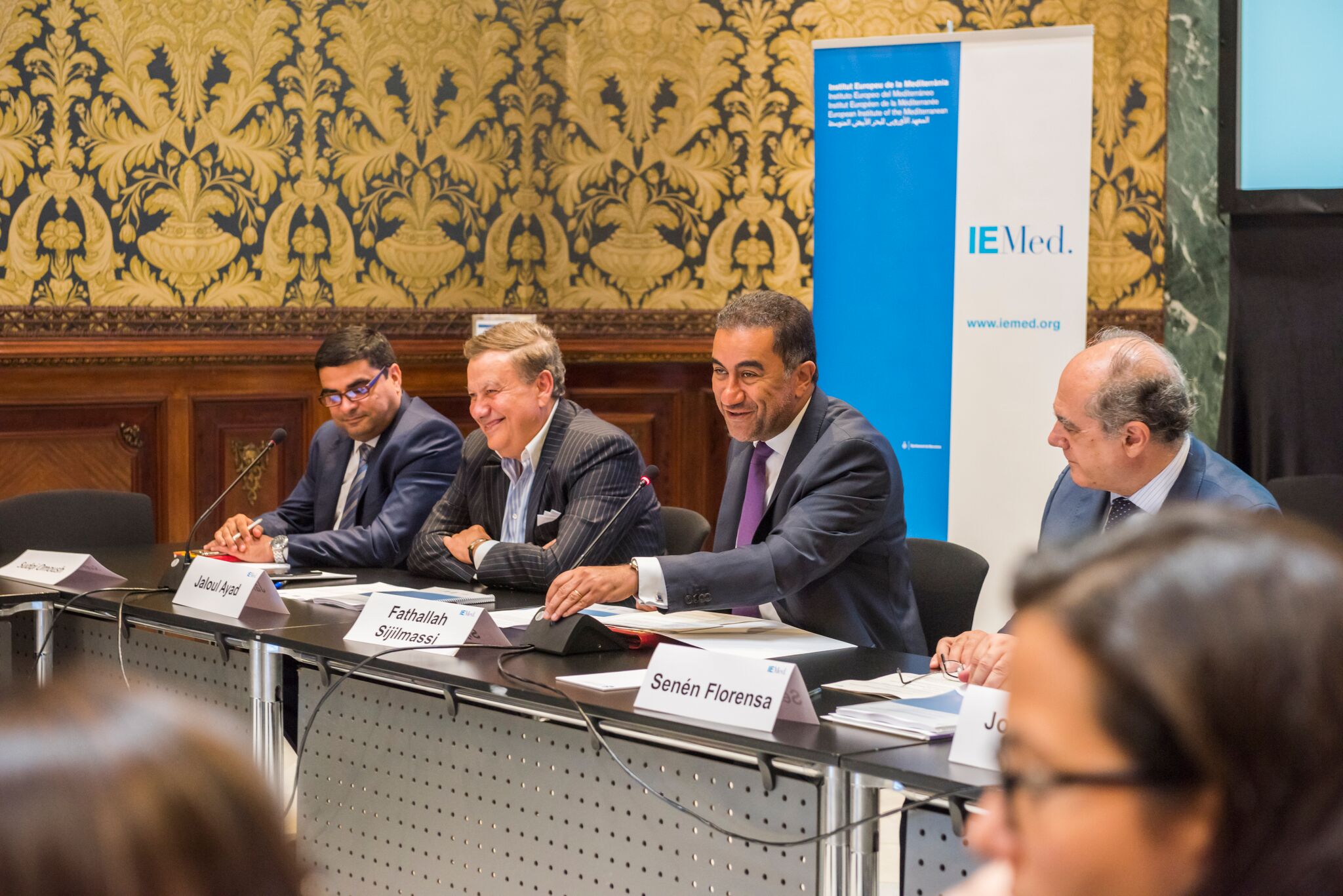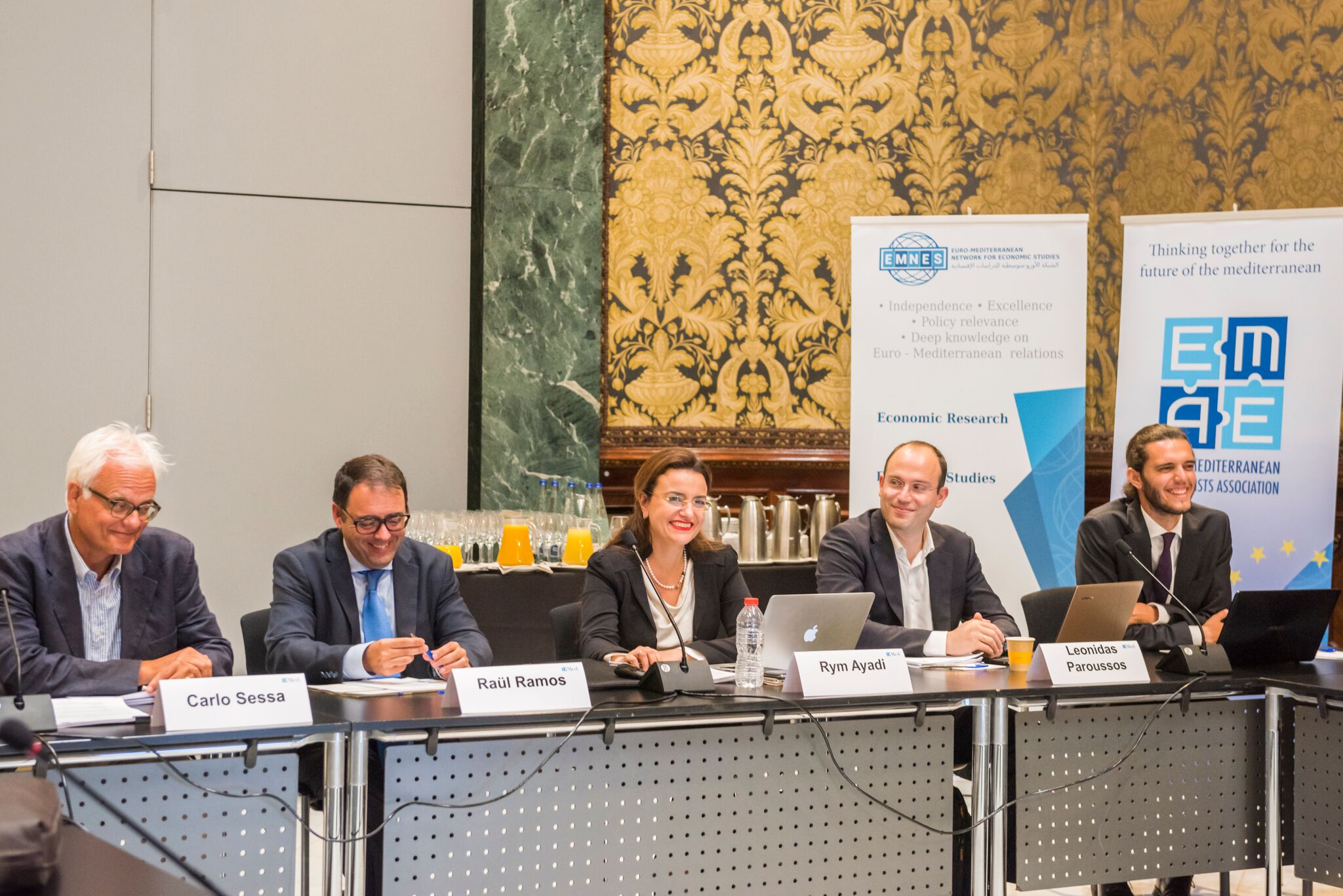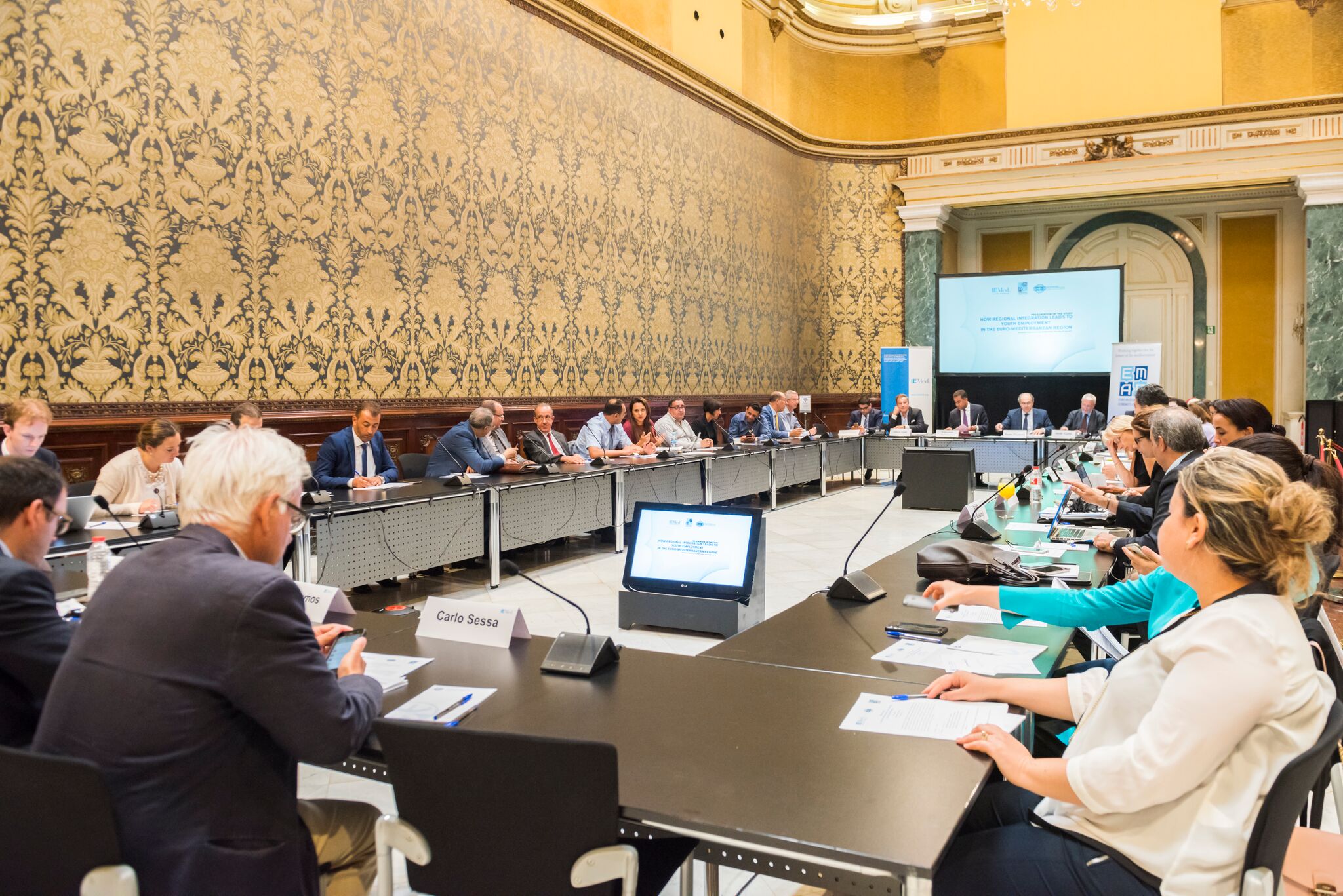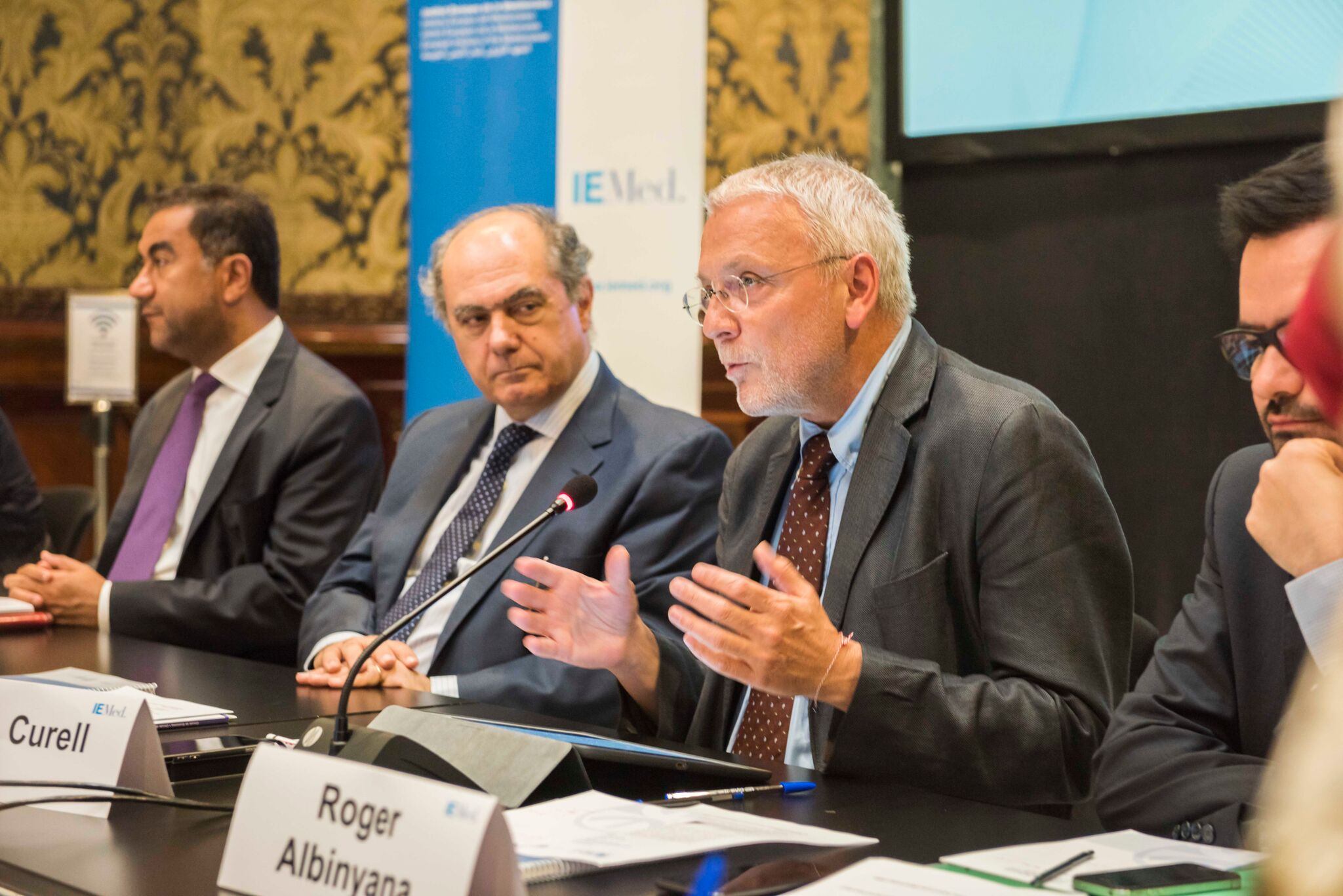Presentation of the Study: How regional integration leads to youth employment in the Euro-Mediterranean region
Thursday, 20 July 2017 – Secretariat of the Union for the Mediterranean
- Introduction
- Welcome addresses
- Presentation of the study “Youth employment and regional integration in the Euro-Mediterranean region”
- Discussion on the study
- Conclusion and closing remarks
Introduction
The objective of this conference is to present the results and conclusions of the study co-led by IEMed- EMEA and with the collaboration of the EMNES network entitled “Youth employment and regional integration in the Euro-Mediterranean region”. This study examines how regional integration can provide both short-term and long-term solutions to the employment crisis in the Euro-Mediterranean region. First, the current state of affairs, challenges and policies as regards to youth unemployment and regional integration in the Euro-Mediterranean region are described. Second, the impact on youth employment creation through regional integration of Mediterranean countries is quantified. Finally, qualitative scenarios on job creation, long-term challenges are devised and policy recommendations to foster youth employment and employability in the region are formulated in light of the alternative scenarios devised and drafted with a specific focus on the role of the Union for the Mediterranean.
Welcome addresses
Fathallah Sijilmassi, Secretary General, Union for the Mediterranean
Fathallhah Sijilmassi welcomed the participants to the premises of the Union for the Mediterranean and mentioned two meetings having recently taken place in the same room where the conference is taking place to underline the importance of youth employment for the Euro-Mediterranean region. The first of these meetings focused on the role of youth and women in combating extremism. The second concerned providing internship opportunities to the youth.
Amb. Sijilmassi introduced the study placing it in the bigger picture of the initiatives in favour of youth employment brought forward by the Union for the Mediterranean and underlining that there is a reason behind the choice of starting its title with the word “how” and not “what”. There have been enough speeches, conferences and declarations about “what” are the problems of the Euro-Mediterranean region – above all the highest youth unemployment worldwide – and what to do to address them – engaging in more regional integration. The question now is “how” to ensure that regional integration is conducive to youth employment because it is by bringing jobs to the youth, bringing concrete results to the people, that the Euro-Mediterranean partnership will deliver on its promises.
Amb. Sijilmassi discussed the importance of achieving concrete results calling for a positive agenda for the Euro-Mediterranean region and stressed the need to be pro-active and forward-looking in making the most out of the wealth of opportunities it represents and not only defeatists about the challenges we are facing. He concluded mentioning that the Union for the Mediterranean recently adopted a roadmap for regional integration and that this is a milestone in the right direction. The idea is to ensure a proper monitoring and evaluation of its implementation because a lot has been done for Euro-Mediterranean integration but little has been achieved.
Senén Florensa, Executive President, European Institute of the Mediterranean
Senén Florensa started his intervention discussing the long-standing collaboration between IEMed and the Union for the Mediterranean and expressed his respect and gratitude to Amb. Sijilmassi for his efforts to revamp the Barcelona Process as Secretary General of the Union for the Mediterranean. He then provided an overview of the difficulties facing the Euro-Mediterranean region and in particular the social, economic and political inclusion of the youth, arguing that disengagement of the latter from political activities might undermine the effort to build lasting institutions in the region.
Mr. Florensa then commented the results of the study and underlined the increase of unbalances resulting from the financial crisis. These developments disproportionately affected the youth as labour markets across the region do not enable them to fulfil their human capital potential, something that will contribute to further dampen growth and increase inequalities. He concluded mentioning that regional integration is on the top of the agenda since the launching of the Barcelona Process and even before that, but that not enough attention was put on fostering South-South integration, which remained very low to this day.
Jaloul Ayad, Former Minister of Finance of Tunisia and President of Med-Confederation
Jaloul Ayad started his intervention stressing the importance of trade and most particularly belonging to a trade group for the development of a country and underlined that the only country in Africa having really benefitted from international trade is South Africa. He argued that the only workable assumption when it comes to Southern Mediterranean countries is that South-South integration into a trade group is not going to happen at a foreseeable horizon and that in such situation the focus should be maintained on bilateral interactions between countries.
Mr. Ayad discussed the different scenarios devised in the study and argued that for regional integration to reach its full potential in creating employment for the youth the role of small and medium firms should be taken more into consideration. These firms account for more of 70% of the labour force in the countries under investigation but are more than half are informal and as such not prepared to take full advantage of global value chains. He added that integrating the latter is an important incentive for small and medium firms to move into formality and that this element is crucial for the prospects of regional integration.
Mr. Ayad further elaborated on the importance of building regional value chains in the Euro-Mediterranean and using these as a lever to tap into the potential for employment creation of small and medium firms. Med-Confederation will organise a conference in March 2018 on this specific topic with the aim of pushing for the adoption of national strategies.
Jordi Curell, Director, Labour Mobility, DG Employment, European Commission
Jordi Currell started his intervention underlining that unemployment is an issue for the Euro-Mediterranean region as a whole, although with important unbalances between countries, meaning that migration is not a sustainable solution to the problem. He argued that achieving full regional integration is a difficult and lengthy process and that it is important to proceed gradually, starting with North-South integration through bilateral negotiations on existing proposals such as the Deep and Comprehensive Free Trade Agreements proposed by the European Union. South-South integration is crucial but difficult to achieve, proceeding with bilateral negotiations is a more realistic option to begin with.
Mr. Currell pursued stressing the importance of differentiating bilateral trade agreements depending on the employment situation of the different countries and ensuring synergies with national strategies for employment and in particular youth employment. He added that to ensure a regional coherence between bilateral agreements and between those agreements and the policies implemented at the national level the Union for the Mediterranean has an important role to play, in particular when it comes to facilitate the creation of working groups and ministerial conferences.
Presentation of the study “Youth employment and regional integration in the Euro-Mediterranean region”
Javier Albarracín introduced the study underlining its core aim of enquiring whether there is still potential for regional integration through trade and investment in the Euro-Mediterranean and if moving towards deepened integration would indeed have positive results in terms of youth employment. He then left the floor to Professor Rym Ayadi, the study leader and the rest of the team to present the main results of the research conducted.
Rym Ayadi stressed that the study covered all member countries of the Union for the Mediterranean but was focused primarily on Southern Mediterranean countries as the lack of South-South integration and the resulting unbalances in Euro-Mediterranean integration are a core feature to consider. She then introduced the research team and provided a brief overview of what would be presented.
Raül Ramos, Expert on employment policies, University of Barcelona
Raül Ramos started his presentation mentioning that unemployment rates in Southern Mediterranean countries are the highest worldwide but that unemployment and most particularly unemployment affects all countries in the Euro-Mediterranean region. The phenomenon affects primarily the youth, with rates twice as high as their adult counterparts, and most particularly young graduates in the case of some Southern Mediterranean countries, suggesting that education is not a guarantee against unemployment.
Mr. Ramos then pointed at the heterogeneity of migration flows in the region, with a notable increase of South-South flows, and the role of labour demand within and across countries as a core determinant of the quantity and quality of jobs created in the region.
Rym Ayadi, Professor at HEC Montreal, President of EMEA, Coordinator of EMNES
Rym Ayadi built on the discussion labour demand within and across countries to identify the main channels of transmission between regional integration and employment, underlining that a core feature of regional integration is the displacement of workers in transition phases, which must be managed through adequate policies at both the national and regional level. She further argued that countries having implemented the policies required to prepare their economies to engage in regional integration might lose less employment in these transition phases than those having not done so.
Prof. Ayadi then provided the participants with an overview of the latest trends in trade and underlined the increase of trade deficits in Southern Mediterranean countries as a striking feature of the current state of affairs in the region. She concluded pointing at the untapped potential for investment in the region, where the level of FDI remained very low as compared to benchmark regions.
Leonidas Paroussos, E3 -Modelling and EMEA
Leonidas Paroussos provided an overview of the challenges faced in modelling regional integration and its impact on employment creation, differentiated across sectors, countries and time. He mentioned various transmission channels retained in the analysis and stressed the importance of the available skills for a given country to benefit in terms of employment from engaging in regional integration.
Mr. Paroussos presented the results of the study and argued that when it comes to the abolition of tariff and non-tariff barriers to trade, countries that are now very protected might lose employment in the short run but in the long run the situation might improve thanks to competitiveness gains. He underlined that the construction and the financial sector are expected to benefit the most from regional integration in terms of youth employment. He concluded mentioning that under the optimistic scenario approximately five million jobs for the region’s youth will be created. This result suggests that continuing with the existing regional integration policies will not suffice to overcome the current youth unemployment crisis.
Carlo Sessa, ISINNOVA and EMEA
Carlo Sessa discussed the impact of two major trends, globalisation and digitalisation, on economies across the Euro-Mediterranean region and presented two alternative scenarios of the related prospects in terms of employment creation and destruction. The two scenarios refer respectively to a pessimistic scenario of unfair growth where the continuation of current policies leads to unsustainable outcomes in terms of level of employment and unequal redistribution of resources and an optimistic, employment-friendly scenario based on the rethinking of industrial policies across the region. Mr. Sessa presented the suggestions of the study concerning the rethinking of such policies, which should focus on labour-intensive sectors with a rationale of favouring the transformation of jobs rather than countering their disruption, following the principles of circular economy and place-based development. He concluded mentioning that there is also a dimension related to changing organisation of work to consider when studying youth unemployment and not only an issue of skills.
Discussion on the study
Discussion on the study, moderated by Javier Albarracín, Director of Socio-economic Department, European Institute for the Mediterranean
Sherif Younis, Financial and Trade Adviser, Secretariat of the Union for the Mediterranean
Sherif Younis provided the participants with an overview of the work of the Union for the Mediterranean in a number of areas relevant to the research conducted for the study and in particular of the projects implemented under the MED4JOBS initiative. He discussed the challenges for the region identified in the last ministerial conference on employment of the Union for the Mediterranean and underlined the decision to compile a database on initiatives for employment at the national and regional level.
Mounir Baati, Policy Unit Operations Department, European Training Foundation
Mounir Baati started his presentation with a mention to human capital development as a core issue when it comes to ensure that regional integration leads to youth employment and stressed that if there is evidence that regional integration will boost economic activity, it is unclear whether it is going to benefit the region’s youth. He pointed at the examples of Jordan and Libya among other countries where economic growth did result in the creation of employment opportunities but not for the youth, who lack the necessary skills to compete on labour markets.
Patricia Augier, President of the Scientific Committee, FEMISE
Patricia Augier presented the work of FEMISE on topics inherent to the focus of the study and underlined that the reports produced brought evidence that the lack of regional integration does result in a number of political and social costs. She called for further investigation on the existing obstacles to enhanced regional integration combining micro and macro approaches, including a thorough assessment of active labour market policies in the region. Mrs. Augier then pointed at the contradiction between reduction of public budgets and increase of spending in infrastructure assumed in the study and asked how to finance the latter considering the former. She added that favouring the emergence of a dynamic private sector is a priority for Southern Mediterranean countries, which need to get out of the middle-income trap.
Brahim El Mouaatamid, Officer, International Centre for Migration Policy Development
Brahim El Mouaatamid pointed out that human mobility was mentioned in the study as a consequence of youth unemployment and not as a dimension of regional integration. In the global approach to mobility and migration of the European Union considers youth unemployment a push factor of migrations but also mentions the existence of unmet needs for skills across the region justifying the expansion of legal migration channels. Mr. El Mouaatamid further argued that there is room for action in matching skills and labour between countries across the Euro-Mediterranean region and mentioned the launching of a study on the topic in collaboration with EMEA.
Cinzia Alcidi, Senior Fellow, Centre For European Policy Studies, EMNES
Cinzia Alcidi started her intervention stressing the importance to acknowledge that trade integration through tariff waiving will not necessarily lead to growth and employment and that having more educated youngsters will not lead to higher employment. There is evidence that liberalising trade between countries with different levels of competitiveness will result in the less competitive accumulating deficits and losing employment and that education is not a guarantee against unemployment, as also pointed out in the study. Remittances are not a solution to the problem either, as they keep wages and consumption high with or without gains in terms of competitiveness.
Dr. Alcidi continued with a discussion on the limited potential for the emergence of regional value chains in the Euro-Mediterranean region. She argued that the example of Germany, which delocalised its production in lower income neighbouring countries within the European Union, suggests that geographic proximity and institutional convergence are important factors in the emergence of regional value chains. These factors are not reunited in the Euro-Mediterranean region, where there is no country with an industrial sector strong enough to take the lead in the emergence of regional value chains and no institutional convergence between countries.
Jamel Trabelsi, Professor at the University of Strasbourg, EMNES
Jamel Trabelsi argued that the study provides solid quantitative modelling and qualitative storytelling but that the link between the two dimensions of scenario building should be better clarified. He pointed at the mismatch between the skills supplied by education systems and demanded by labour markets in the region as a core determinant of youth unemployment and elaborated some considerations about the impact of robotisation on such mismatches. He suggested to take into account this issue in the scenarios and stressed the importance of rethinking the role of taxation.
Najet El Makkaoui, Professor at Paris Dauphine University, EMNES
Najat El Makkaoui discussed the importance of demographic trends for the prospects of economic growth and employment creation in the region, pointing at differences and potential complementarities between the challenges faced by European countries with aging populations and Southern Mediterranean countries with expanding active populations. If the latter countries invest adequately in health and human capital they are likely to experience a second demographic dividend, which can be problematic considering the current employment situation. She illustrated the problem with some graphics about the evolution of the shares of youngest and oldest cohorts in the working age population and argued that with better designed social security systems and regional integration strategies the undergoing demographic shift is a window of opportunity for growth. Prof. El Makkaoui concluded suggesting to add the design of social security systems in the scenario-building of the study.
Conclusion and closing remarks
Conclusion
Rym Ayadi thanked the discussants for the wealth of inputs and mentioned that these represent important avenues for the refining of both the quantitative and qualitative scenarios in the study, which shall indeed be better linked to each other.
Leonidas Paroussos stressed that in the current situation of high unemployment youngsters are forced to accept employment opportunities regardless of how these reflect their level of skills, resulting in a vicious circle of mismatch between demand and supply of jobs in the market. This incremental effect is difficult to capture in the modelling exercise. He then better specified certain assumptions of the model concerning the effects of reducing tariff and non-tariff barriers on productivity and competitiveness. He concluded that demographic trends not being factored in the model is indeed an important limitation as these influence the reallocation of the labour force in the economy with short and long term repercussion on the level of productivity and employment.
Raul Ramos commented that there have been several technological revolutions in the history of mankind and that the question is not whether capital will replace labour but the extent to which technological advancements will go hand-in-hand with the development of human capital. Carlo Sessa further stressed that the appropriate response to these challenges is not a luddite reaction but an adaptive and pro-active rethinking of educational and industrial policies to enable for better matching between demand and supply of labour as well as a fairer redistribution of resources. He concluded with a brief discussion on the benefits of basic income in light of the challenges discussed during the day.
Closing remarks by Roger Albinyana, Director of the Department of Euro-Mediterranean Policies and Regional Programmes, European Institute of the Mediterranean
Roger Albinyana closed the conference with some general considerations about the project. He recalled that the first meeting of the project took place the day after the Brexit vote, which put under pressure the most successful experiment of regional integration worldwide that is the European Union, urging the team to come out with tangible results concerning the benefits of regional integration. He argued that regional integration is a lengthy and difficult process with a number of question marks concerning the benefits of integrating further but that the alternative is isolation and it is a matter of fact that isolation hampers the possibility for a society to grow in a sustainable and inclusive way.
The study does not tell us that regional integration is the only way to create employment and underlines that regional integration is likely to bring positive outcomes in terms of employment only under certain conditions, but it does conclude that there is a point in engaging in it. It is important to move into action now. The study is in the hands of the Union for the Mediterranean, which has the power to lift the results into the policy level, starting perhaps with the organisation of a ministerial conference on trade, which did not happen in the last seven years.




